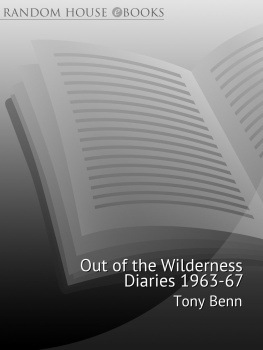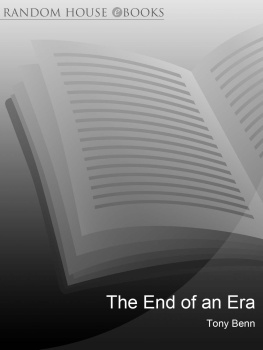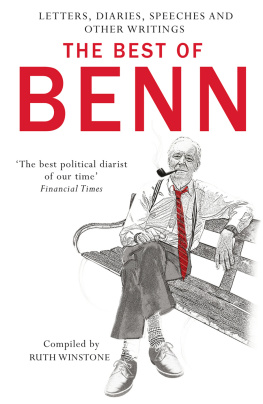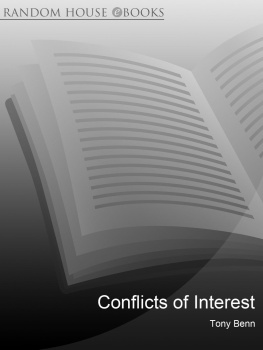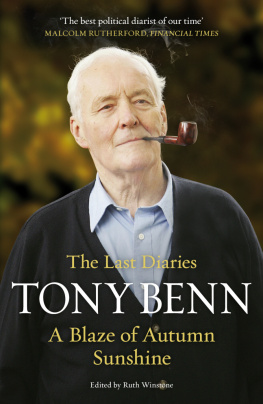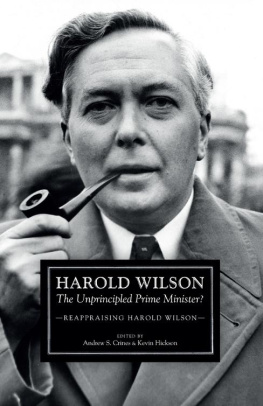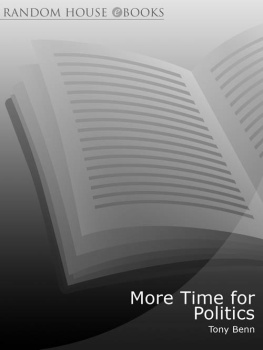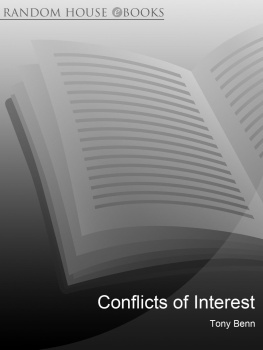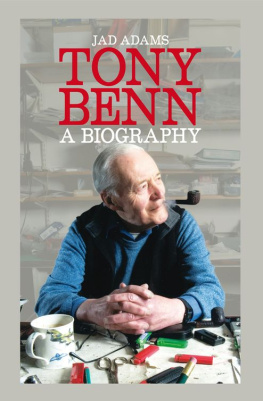Contents
About the Book
1963 saw Labours emergence from its wilderness years in Opposition, and the election of Harold Wilson following the unexpected death of Hugh Gaitskell. In the first Wilson government of 1964 Benn was made Postmaster General and became known as an innovator for his introduction of the Giro and arguing for a radical broadcasting policy. After Labours landslide victory of 1966 he was appointed to the Cabinet as Minister of Technology, but Labours honeymoon came to an abrupt end in 1967 with the introduction of devaluation, leading to disilliusionment with the Government.
Tony Benns account on his relations with the industrialists, television and press chiefs, the Palace and the diplomatic world as well as trade unionists, civil servants, and his Cabinet colleagues, reveals the workings of our political and economic systems at the highest level.
Out of the Wilderness is a unique political record of the 1960s, told by a man who served in five Labour administrations and who today is one of the most experienced figures both in and out of the House of Commons.
About the Author
Tony Benn has been the Labour Member of Parliament for Chesterfield since March 1984. He was elected to the National Executive Committee of the Labour Party in 1959, and was the Chairman of the Party in 19712. He has been a Cabinet Minister in every Labour Government since 1964, holding the positions of Postmaster General, Minister of Technology and Minister of Power. From 19749 he was Secretary of State for Industry, later Secretary of State for Energy and one-time President of the Council of Energy Ministers of the European Community.
He is the author of eleven books including Arguments for Socialism, Arguments for Democracy, Fighting Back and three volumes of Diaries Out of the Wilderness, Office Without Power and Against the Tide. He holds four Honorary Doctorates from British and American universities. He is married to Caroline and they have four children and six grandchildren.
Also by Tony Benn
The Regeneration of Britain
Speeches
Arguments for Socialism
Arguments for Democracy
Parliament, People and Power
The Sizewell Syndrome
Fighting Back: Speaking Out for Socialism in the Eighties
A Future for Socialism
Common Sense (with Andrew Hood)
Free Radical
Dare to be a Daniel: Then and Now
Letters to my Grandchildren: Thoughts on the Future
Years of Hope: Diaries 1940-1962
Out of the Wilderness: Diaries 1963-1967
Office Without Power: Diaries 1968-1972
Against the Tide: Diaries 1973-1976
Conflicts of Interest: Diaries 1977-1980
The End of an Era: Diaries 1980-1990
The Benn Diaries: Single Volume Edition 1940-1990
Free at Last! Diaries 1991-2001
More Time for Politics: Diaries 2001-2007
Out of the Wilderness
Diaries 196367
Tony Benn

List of Illustrations
, the flamboyant Bishop of Southwark
speaking at a rally in Glasgow
in 1954 for the H-Bomb National Committee
with Jo Grimond
receiving a supporting hand from his wife
with the Instrument of Disclaimer
outside Number 10 on his appointment as Prime Minister
with Wilson in 1964
, Labours Lord Chancellor
, Minister for Education
, 1964
on the Labour Partys National Executive Committee
in the corridors of power
, 30 January, 1965
, new Leader of the Conservative Party
, Under Secretary at Education
, leaving the GPO Tower
of Brighton
at the Water for Peace Conference in Washington
, December 1967
at the Atomic Energy Authority plant at Risley
Acknowledgments
My diary could never have been published without the help of many people over many years and to all these I am deeply grateful.
The decision to publish owes a great deal to Anne McDermid, who has always encouraged the idea, and particularly to Richard Cohen at Century Hutchinson, whose interest in the text and gentle but constant persuasion overcame my remaining hesitancy. I am also grateful to Century Hutchinson editors Kate Mosse and Stephanie Darnill, and to Heather Leithead, who all worked so hard and so enthusiastically against very tight deadlines.
I owe a great debt of gratitude to my sons, Dr Stephen Benn, who supervised the project from its inception, and Joshua Benn, who together devised the system for transcribing the diary on to word processors and advised on the many technical aspects involved.
Sheila Hubacher has tackled the huge job of transcribing hundreds of diary cassettes with equanimity and has worked perceptively on the edited text.
Most particularly I must place on record the central role played by Ruth Winstone who has managed the whole diary project herself, editing an original text of half a million words for this volume, undertaking a great deal of research and preparing the biographical and chapter notes.
Finally, I want to thank the Rowntree Trust for the funds which it generously provided to establish the diary office and start the typing, and for its confidence in the historical value of the archives; and Lord Chitnis for his personal encouragement throughout.
Illustration Acknowledgments
The publishers would like to thank the following for kindly supplying the line drawings and photographs used in this volume. Whilst every attempt has been made to trace copyright, in some cases this has not been possible. The publishers would like to apologise for any inconvenience this might cause.
Line drawings in text
Kingworth, Daily Mail; Vicky, Evening Standard; Trog, Observer; Cummings, Sunday Express; Papas, Guardian; Newbury, Western Daily Press; A. W. Lloyd, Punch.
Photographs
Photo Source; Press Association; Popperfoto; Syndication International; Elliot-Automation; Daily Herald.
This volume is dedicated with love and affection to Caroline and all our family, and to those in the Labour Movement who gave us their friendship and taught us our socialism over the years.
Foreword
This first volume of my political diaries covers the period from January 1963 to December 1967, at the beginning of which the Labour Party was in its twelfth year of Opposition, after three consecutive General Election defeats; while I was still excluded from the Commons, having been disqualified, since 1960, from sitting as MP for Bristol South East by an old peerage law.
The diary opens with the death of Hugh Gaitskell and the succession of Harold Wilson; my disclaimer of the peerage and reelection to the Commons; and Labours narrow victory at the polls which took us into power and led to my appointment as Postmaster General. The volume goes on to record the Labour landslide of 1966, my entry in to the Cabinet as Minister of Technology and the abrupt end of Labours honeymoon following the unpopular economic measures of July 1966. It finishes just after the 1967 devaluation, when Labours high hopes had begun to evaporate.
I was initially optimistic about Labours radical reforming possibilities, and fully supportive of the Government and the Prime Minister, but I began to form doubts during these events, in ways that will become clear.
I inherited strong radical instincts from my family, and by 1963 could claim more than ten years of Commons and constituency experience and great enthusiasm and energy. But I did not, at that time, have a real socialist understanding of the structure of our society. That came as a result of my experience over many years and in this sense the present volume and those that follow are the diaries of a socialist-in-the-making as well as the record of an active politician.
Next page
